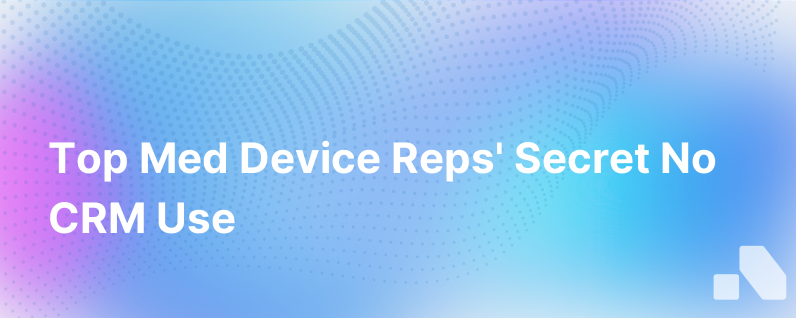Why Top Medical Device Sales Reps Dont Use Crm
Published on December 19, 2023 by David Zhang
The medical device industry is a unique and complex landscape where sales representatives play a pivotal role in connecting innovative products with healthcare providers. These highly skilled reps are integral to educating and advising on some of the most cutting-edge technologies in healthcare.
However, despite technological advancements in sales processes across industries, many experienced medical device sales reps are resistant to adopting Customer Relationship Management (CRM) systems in their sales strategies. Let's explore the reasons why CRM adoption may present challenges for top medical device sales reps and consider alternative tools that could propel their success.
Inherent Complexity and Specialized Knowledge
Medical device sales reps deal with highly specialized and complex products. These products often require in-depth demonstrations, which makes the sales process exceptionally consultative. Reps need to have a profound understanding of the clinical and technical aspects of their devices, as well as the specific needs of individual healthcare providers.
CRMs, which are regularly designed with a one-size-fits-all approach, can lack the capability to efficiently manage the nuanced details of each device and its corresponding sales process.
The Human Touch in a Relationship-Driven Industry
Sales in the medical device sector are heavily relationship-driven. Sales reps often have long-standing relationships with doctors, surgeons, hospital administrators, and procurement teams. For these relationships to flourish, personal interaction and trust are key. Reps spend much time nurturing these connections, often through face-to-face meetings or tailored interactions.
CRM systems can seem impersonal and may conflict with the nuanced, high-touch approach favored by top reps. They might view the time spent on data entry and navigation of a CRM as a distraction from the real work of building relationships and delivering personalized service.
The Burden of Data Entry
Another point of resistance is the onerous data entry that CRMs often require. The administrative burden of entering and updating customer interactions, sales figures, and prospective leads can be significant. The effort expended to input data into a CRM doesn't always translate to noticeable efficiency or effectiveness improvements.
Medical device sales reps might argue that the time spent feeding the CRM could be better invested in direct communication with clients or in the operating room, supporting a hands-on demonstration of a medical device.
Regulatory Compliance and Security Concerns
The medical device industry is tightly regulated. With stringent compliance standards, such as HIPAA in the United States, reps are rightfully cautious about where and how patient and hospital information is recorded and stored.
Many CRMs are not specifically designed with these regulations in mind, potentially putting reps in a difficult position regarding compliance. Some might find that the risk of inadvertently mishandling sensitive data is not worth the perceived benefits of CRM software.
Mobility and Accessibility Issues
Medical device sales reps are often in the field, traveling from one healthcare facility to another. Effective use of their time requires mobile-friendly tools that are intuitive and facilitate quick access to information. While many CRMs offer mobile solutions, not all are user-friendly or tailored to the specific needs of medical reps on the go.
The frustration that ensues from navigating a mobile CRM app that's not up to scratch can deter reps from engaging with the system thoroughly.
Alternative Solutions Could Prove More Beneficial
Medical device sales reps are in a prime position to benefit from a new wave of sales enablement tools that are more tailored to their unique workflow. Technology solutions such as Aomni provide a focused suite of tools designed to align with the strategic, consultative approach that is necessary for medical device sales.
These alternatives to CRM systems understand that the magic of sales lies within the relationship and nuanced understanding of the customer's needs. Tools like Aomni manage these elements by:
- Reducing the burden of data entry through AI and intelligent automation.
- Offering real-time account research and insights that reps can access on demand.
- Providing competitive intelligence that's easily digestible and actionable.
- Adding value directly to the sales process without adding cumbersome administrative tasks.
Sales enablement tools aim to be helpful rather than a hindrance, enhancing the reps' ability to perform their jobs with more efficiency and less frustration.
Conclusion
While CRMs are a staple in many industries, the resistance among top medical device sales reps is not unfounded. The CRM systems currently on offer may not necessarily align with the bespoke needs of a highly specialized and relationship-driven field such as medical device sales.
In recognition of this, sales enablement platforms like Aomni are crafting tools that respect and enhance the sales rep's workflow. They provide strategic advantage without the hassle of traditional CRM systems, potentially offering a middle ground where technology empowers rather than hinders the art of medical device sales.